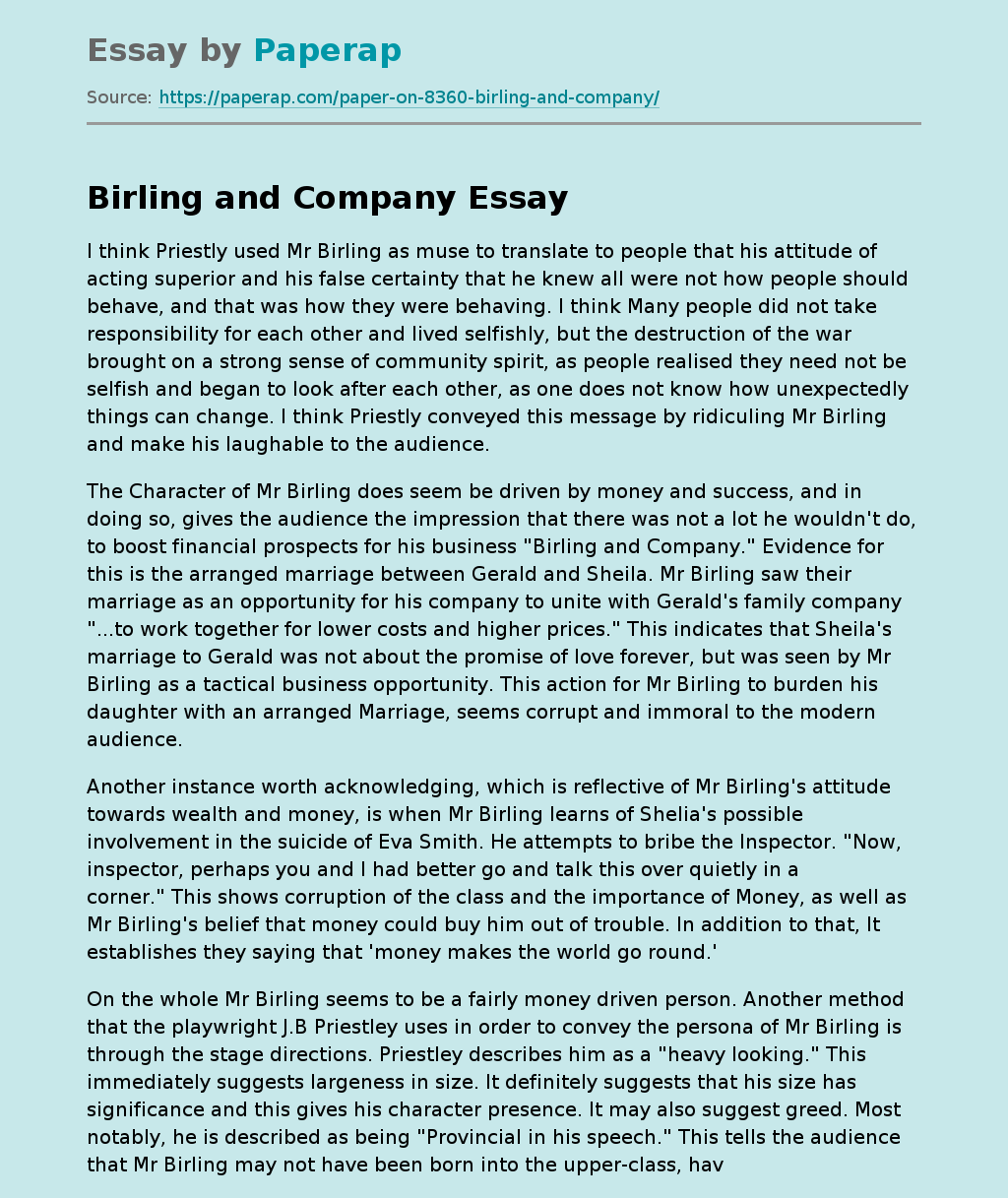Birling and Company
I think Priestly used Mr Birling as muse to translate to people that his attitude of acting superior and his false certainty that he knew all were not how people should behave, and that was how they were behaving. I think Many people did not take responsibility for each other and lived selfishly, but the destruction of the war brought on a strong sense of community spirit, as people realised they need not be selfish and began to look after each other, as one does not know how unexpectedly things can change.
I think Priestly conveyed this message by ridiculing Mr Birling and make his laughable to the audience.
The Character of Mr Birling does seem be driven by money and success, and in doing so, gives the audience the impression that there was not a lot he wouldn’t do, to boost financial prospects for his business “Birling and Company.” Evidence for this is the arranged marriage between Gerald and Sheila.
Mr Birling saw their marriage as an opportunity for his company to unite with Gerald’s family company “…to work together for lower costs and higher prices.” This indicates that Sheila’s marriage to Gerald was not about the promise of love forever, but was seen by Mr Birling as a tactical business opportunity. This action for Mr Birling to burden his daughter with an arranged Marriage, seems corrupt and immoral to the modern audience.
Another instance worth acknowledging, which is reflective of Mr Birling’s attitude towards wealth and money, is when Mr Birling learns of Shelia’s possible involvement in the suicide of Eva Smith.
He attempts to bribe the Inspector. “Now, inspector, perhaps you and I had better go and talk this over quietly in a corner.” This shows corruption of the class and the importance of Money, as well as Mr Birling’s belief that money could buy him out of trouble. In addition to that, It establishes they saying that ‘money makes the world go round.’
On the whole Mr Birling seems to be a fairly money driven person. Another method that the playwright J.B Priestley uses in order to convey the persona of Mr Birling is through the stage directions. Priestley describes him as a “heavy looking.” This immediately suggests largeness in size. It definitely suggests that his size has significance and this gives his character presence. It may also suggest greed. Most notably, he is described as being “Provincial in his speech.” This tells the audience that Mr Birling may not have been born into the upper-class, having had acquired new money. This tied in with Mr Birling’s business mindedness, expose his character as one that demands presence.
Priestley use of tension to create and elevate atmosphere is significant in the play. In Act 1, the scene ends at a climax when Gerald reveals to Sheila that he knew Eva Smith as Daisy Renton. This creates suspense for the 1945 audience and also the modern audience. The use of Priestley’s stage direction complements this by using adverbs such as ‘coldly’ or ‘defiantly’, in order to create the atmospheric mood intended.
I think the message behind Priestley’s use of stage direction is that through the actions of the actors and actresses on stage, the most blatant messages are sent and emotion is made obvious, whilst dialogue confuses all this, making the interpretation of the characters different and personal to different people. Through this ideology, I think Priestley’s is trying to convey the message that although Mr Birling may act smug and superior, he is still a person, like everyone else, no matter how much he tries to put himself on a pedestal. The message that the modern audience could grasp from that is that; no matter how many different roles there are in society, with varying degrees of importance, we are all the same, none being ‘better’ than the other but equal.
A point worth mention to further explore the character of Mr Birling is when he gives Eric and Gerald advice about life, saying “…a man has to look after himself-and his family too…” This is interesting as he hesitates to say “-and his family too…” indicating that his family were an after thought. This shows his extreme self-interest and also re-establishes his uncaring attitude. Another point that bears mentioning is when Mrs Birling reveals her role in the suicide of Eva Smith. The first thing Mr Birling says is: “I must say Sybil, that when this comes out at the inquest, it isn’t going to do us much good, The press might take it up.”
This shows that Mr Birling has no regret for his part responsibility in Eva’s suicide apart from her death; which would leave his status in ruins, thus destroying his chance of a Knighthood. This presents Mr Birling as quite cold hearted, as whilst most people would show remorse, his part in the girls death seems to leave no scratch upon his conscience. To recapitulate, The Character of Mr Birling is, in a nutshell presented as business minded, conceited, cold-hearted and arrogant.
His character is certainly one that demands presence, which you could refer to as being ‘larger than life.’ He has mainly negative attributes which make him a dislikeable character. Through J.B Priestley’s use of ‘dramatic irony’, suspense and stage direction, he uses the character of Mr Birling to convey message of equality and positions in Society. Priestley does this by conveying attitudes that are morally wrong, in Mr Birling, and ridiculing them. It is fair to say, then, the Character of Mr Birling is the true essence of the play.
Birling and Company. (2017, Nov 09). Retrieved from https://paperap.com/paper-on-8360-birling-and-company/

